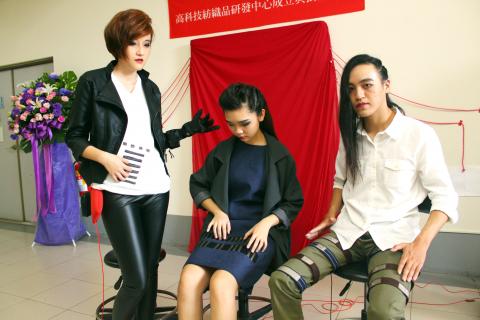Imagine going to a concert where the band members need nothing but their clothing to create the same dazzling spectacle they provided when they still carried their instruments. That dream might be coming true this year after Shu-Te University employed X-Static fiber, which emits sounds that are comparable to actual musical instruments via the transmission of digital signals, in its clothing designs.
Department of computer science and informational technology assistant professor Huang Yung-jen (黃永仁) said that a research team at the department has utilized silver in X-Static fiber to transmit signals, adding that precautions have been taken so that the wearer will not get an electric shock.
The team also ensured that the hidden sensors in the cloth are removable so that the clothes could be washed, thus enabling repeated use, Huang said.

Photo: Chen You-cheng, Taipei Times
The research group is in the process of tweaking the design, such as changing the reception device from an audio output device to portable stereo devices, Huang said.
In practice, the clothing would be able to emit sounds when it is touched by transmitting the signals to a portable device on the wearer’s belt, the university said.
Student Tsou Sheng-chuang (鄒勝壯) said he has been playing the drums for many years and using the clothing was not hard to learn.
The sound quality is comparable to that of actual instruments, which could remove the necessity of carrying around heavy instruments such as drums, Tsou said.
However, guitarist Hung Yi-shan (洪誼珊) said it was difficult for her to grasp how to play music with the clothing and she had to try it for three days before getting the hang of it.
“It’s just different without the actual instrument in my hands, but it’s a great feeling to be able to play music wherever I want to,” Hung said.
The university said it hopes its products will help to integrate entertainment and fashion with the concept of healthy living.

Alain Robert, known as the "French Spider-Man," praised Alex Honnold as exceptionally well-prepared after the US climber completed a free solo ascent of Taipei 101 yesterday. Robert said Honnold's ascent of the 508m-tall skyscraper in just more than one-and-a-half hours without using safety ropes or equipment was a remarkable achievement. "This is my life," he said in an interview conducted in French, adding that he liked the feeling of being "on the edge of danger." The 63-year-old Frenchman climbed Taipei 101 using ropes in December 2004, taking about four hours to reach the top. On a one-to-10 scale of difficulty, Robert said Taipei 101

Nipah virus infection is to be officially listed as a category 5 notifiable infectious disease in Taiwan in March, while clinical treatment guidelines are being formulated, the Centers for Disease Control (CDC) said yesterday. With Nipah infections being reported in other countries and considering its relatively high fatality rate, the centers on Jan. 16 announced that it would be listed as a notifiable infectious disease to bolster the nation’s systematic early warning system and increase public awareness, the CDC said. Bangladesh reported four fatal cases last year in separate districts, with three linked to raw date palm sap consumption, CDC Epidemic Intelligence

Two Taiwanese prosecutors were questioned by Chinese security personnel at their hotel during a trip to China’s Henan Province this month, the Mainland Affairs Council (MAC) said yesterday. The officers had personal information on the prosecutors, including “when they were assigned to their posts, their work locations and job titles,” MAC Deputy Minister and spokesman Liang Wen-chieh (梁文傑) said. On top of asking about their agencies and positions, the officers also questioned the prosecutors about the Cross-Strait Joint Crime-Fighting and Judicial Mutual Assistance Agreement, a pact that serves as the framework for Taiwan-China cooperation on combating crime and providing judicial assistance, Liang

US climber Alex Honnold left Taiwan this morning a day after completing a free-solo ascent of Taipei 101, a feat that drew cheers from onlookers and gained widespread international attention. Honnold yesterday scaled the 101-story skyscraper without a rope or safety harness. The climb — the highest urban free-solo ascent ever attempted — took just more than 90 minutes and was streamed live on Netflix. It was covered by major international news outlets including CNN, the New York Times, the Guardian and the Wall Street Journal. As Honnold prepared to leave Taiwan today, he attracted a crowd when he and his wife, Sanni,